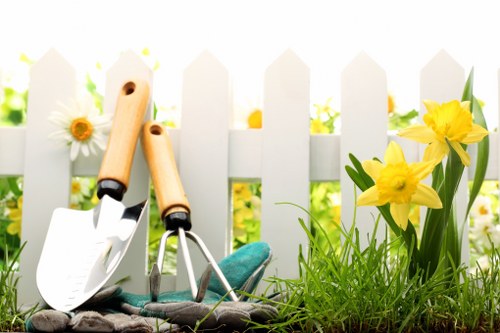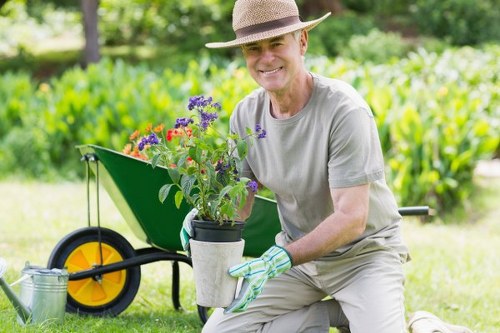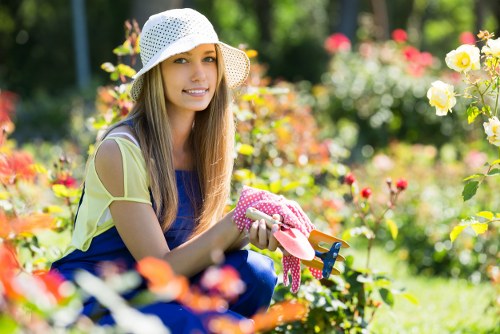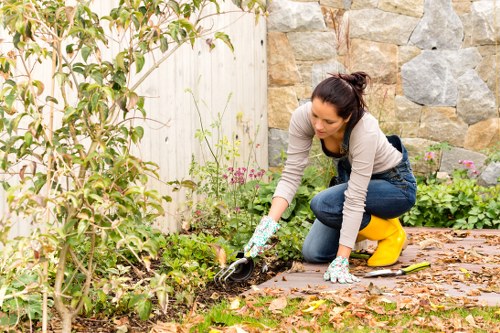Landscape Gardening in Stratford: Transforming Outdoor Spaces

Landscape gardening in Stratford is an art that combines creativity, functionality, and sustainability to transform outdoor spaces into beautiful and inviting environments. Whether you own a residential property or manage a commercial space, incorporating landscape gardening can significantly enhance the aesthetic appeal and value of your property.
Stratford, known for its rich history and vibrant community, offers a unique backdrop for landscape gardening. The region's climate, soil conditions, and local flora provide ample opportunities for gardeners to create stunning landscapes that thrive year-round.
In this comprehensive guide, we will explore the various aspects of landscape gardening in Stratford, including design principles, plant selection, maintenance tips, and the benefits it brings to both property owners and the community.

Understanding Landscape Gardening
Landscape gardening is more than just planting flowers and shrubs; it involves thoughtful planning and execution to create a harmonious outdoor space that complements the existing architecture and natural surroundings. Here are some key components to consider:
- Design and Layout: The foundation of any successful landscape garden is a well-thought-out design. This includes the arrangement of plants, pathways, water features, and seating areas.
- Plant Selection: Choosing the right plants is crucial for ensuring a thriving garden. Factors such as local climate, soil type, and sunlight exposure play a significant role in plant selection.
- Sustainability: Incorporating sustainable practices, such as using native plants and efficient irrigation systems, helps reduce environmental impact and maintenance costs.
By understanding these components, gardeners in Stratford can create landscapes that are both beautiful and functional.

Design Principles for Stratford Gardens
1. Balance and Harmony
Achieving balance in landscape design means distributing visual weight evenly across the space. This can be done through the symmetrical placement of plants and structures or by creating a sense of equilibrium with asymmetrical arrangements.
Symmetrical Balance
Symmetrical balance involves mirroring elements on either side of a central axis. This approach creates a formal and structured look, ideal for traditional gardens.
Asymmetrical Balance
Asymmetrical balance relies on the careful placement of different elements to achieve visual stability without exact duplication. This technique offers a more natural and relaxed feel to the garden.
2. Focal Points
Every garden should have one or more focal points that draw the eye and add interest. These can be achieved through stunning plant arrangements, sculptures, water features, or unique architectural elements.
3. Unity and Variety
While unity ensures that all elements of the garden work together cohesively, variety adds diversity and prevents the space from becoming monotonous. Striking the right balance between unity and variety is key to a visually appealing landscape.

Choosing the Right Plants for Stratford
Selecting plants that thrive in Stratford’s climate and soil conditions is essential for a successful landscape garden. Here are some tips to help you make the best choices:
Native Plants
Native plants are adapted to the local environment, making them more resilient and requiring less maintenance. They also support local wildlife and contribute to the ecosystem's health.
Seasonal Interest
Incorporate a mix of plants that provide interest throughout the year. Choose flowering plants for spring and summer, evergreens for winter structure, and plants with colorful foliage for autumn appeal.
Diversity
Include a variety of plant types, such as trees, shrubs, perennials, and groundcovers, to create a layered and textured landscape. Diversity also enhances biodiversity and supports a range of pollinators and beneficial insects.
- Trees: Oak, maple, and dogwood.
- Shrubs: Hydrangeas, lavenders, and boxwoods.
- Perennials: Hostas, daylilies, and coneflowers.

Maintenance Tips for a Thriving Garden
Maintaining a landscape garden requires regular care and attention. Here are some essential maintenance tips to keep your Stratford garden in pristine condition:
Irrigation
Proper watering is crucial for plant health. Invest in an efficient irrigation system, such as drip irrigation, to ensure consistent moisture levels while conserving water.
Pruning and Trimming
Regular pruning helps shape plants, remove dead or diseased branches, and promote healthy growth. It also enhances the overall appearance of the garden.
Weed Control
Weeds compete with desired plants for nutrients and water. Implementing mulch or using organic weed control methods can help keep unwanted plants at bay.
Soil Health
Healthy soil is the foundation of a thriving garden. Regularly amend the soil with compost and organic matter to improve fertility and structure.
Pest Management
Monitor your garden for signs of pests and diseases. Use integrated pest management (IPM) techniques to address issues without harming beneficial insects.
- Regularly inspect plants for damage.
- Use natural predators to control pest populations.
- Avoid chemical pesticides when possible.

The Benefits of Landscape Gardening in Stratford
Investing in landscape gardening offers numerous benefits that extend beyond aesthetic appeal. Here are some key advantages:
Environmental Benefits
- Improved Air Quality: Plants absorb carbon dioxide and release oxygen, enhancing air quality.
- Water Conservation: Sustainable gardening practices reduce water usage and protect local water resources.
- Wildlife Habitat: Gardens provide shelter and food for various wildlife, promoting biodiversity.
Economic Benefits
- Property Value: A well-maintained garden can significantly increase property value.
- Energy Savings: Strategic planting can provide natural insulation, reducing heating and cooling costs.
- Cost Efficiency: Sustainable gardening practices lower maintenance expenses over time.
Social Benefits
- Community Engagement: Beautified spaces foster a sense of pride and community among residents.
- Recreational Space: Gardens offer areas for relaxation, social gatherings, and outdoor activities.
- Mental Health: Spending time in green spaces has been shown to reduce stress and improve overall well-being.

Hiring a Professional Landscape Gardener in Stratford
While some homeowners enjoy the hands-on approach to gardening, hiring a professional landscape gardener can ensure a high-quality and well-maintained garden. Here are reasons to consider professional services:
Expertise and Experience
Professional landscapers possess the knowledge and skills to design and execute landscapes that are both beautiful and functional. They stay updated on the latest gardening trends and techniques, ensuring your garden remains contemporary and sustainable.
Time and Convenience
Creating and maintaining a landscape garden can be time-consuming. Professionals handle all aspects, from initial design to ongoing maintenance, allowing you to enjoy your garden without the hassle.
Customized Solutions
Every property is unique, and professional landscapers tailor their services to meet your specific needs and preferences. They consider factors such as space, budget, and personal style to create a personalized garden.
Cost-Effective
While there is an upfront cost, hiring a professional can save money in the long run by preventing costly mistakes and ensuring efficient use of resources.
- Initial landscape design and planning.
- Plant selection and installation.
- Regular maintenance and seasonal updates.
Consider reaching out to local Stratford landscape gardening services to discuss your project and explore how they can bring your vision to life.

Popular Landscape Gardening Styles in Stratford
Stratford's diverse community embraces a variety of landscape gardening styles. Here are some popular options to consider:
Modern Minimalist
Characterized by clean lines, geometric shapes, and a limited color palette, the modern minimalist style focuses on simplicity and functionality. This style often incorporates hardscaping elements like concrete, steel, and glass.
Traditional English Garden
The traditional English garden is known for its lush greenery, flowering plants, and charming pathways. This style emphasizes a romantic and timeless aesthetic, often featuring perennials, rose bushes, and ornamental shrubs.
Zen Garden
Inspired by Japanese landscaping, Zen gardens promote tranquility and meditation. They typically include elements like gravel, rocks, water features, and carefully pruned plants to create a peaceful environment.
Eclectic Garden
The eclectic garden style blends various elements and styles to create a unique and personalized space. It encourages creativity and the use of diverse plant species, colors, and textures.
Sustainable Garden
Sustainable gardens prioritize environmental responsibility. They utilize native plants, composting, rainwater harvesting, and organic gardening practices to minimize ecological impact.

Incorporating Hardscaping Elements
Hardscaping refers to the non-living components of a garden, such as pathways, walls, patios, and water features. Incorporating hardscaping elements can enhance the functionality and aesthetic appeal of your landscape garden.
Pathways and Walkways
Pathways guide visitors through the garden and connect different areas. Materials like stone, gravel, and paving slabs can be used to create durable and attractive walkways.
Patios and Decks
Outdoor living spaces like patios and decks provide areas for relaxation and entertainment. These spaces can be furnished with seating, dining areas, and outdoor kitchens.
Retaining Walls
Retaining walls help manage elevation changes and prevent soil erosion. They also serve as decorative features, adding structure and definition to the landscape.
Water Features
Incorporating water features such as fountains, ponds, or waterfalls adds a soothing sound and visual interest to the garden. They also attract wildlife and create a focal point.
Lighting
Landscape lighting enhances the beauty of the garden at night and improves safety by illuminating pathways and key features. Use energy-efficient LED lights to reduce energy consumption.

Seasonal Care and Planting
Maintaining a vibrant landscape garden requires attention to seasonal changes. Here’s how to care for your garden throughout the year:
Spring
Spring is a time for planting new growth and preparing the garden for the upcoming seasons. Start by clearing any debris, pruning dead branches, and fertilizing the soil. Plant annuals, bulbs, and new shrubs to add color and structure.
Summer
During summer, focus on regular watering, especially during dry spells. Mulch helps retain moisture and suppress weeds. Prune back overgrown plants and deadhead flowers to encourage continuous blooming.
Autumn
Autumn is ideal for planting perennials and preparing the garden for winter. Clean up fallen leaves, mulch extensively, and protect sensitive plants from frost. It’s also a good time to divide and transplant existing plants.
Winter
In winter, maintain garden structures and prepare tools for the next growing season. Protect delicate plants by covering them with frost cloths or moving potted plants indoors. Plan your garden layout and order seeds or plants for spring.
- Regularly inspect plants for signs of stress or disease.
- Adjust watering schedules based on weather conditions.
- Rotate plants to prevent soil depletion and reduce pest buildup.

Integrating Sustainable Practices
Sustainability in landscape gardening is about creating beautiful spaces while minimizing environmental impact. Here are some practices to incorporate:
Rainwater Harvesting
Collecting rainwater reduces dependence on municipal water supplies and provides plants with natural moisture. Install rain barrels or underground storage systems to capture and store rainwater.
Composting
Composting organic waste enriches the soil with nutrients, improves soil structure, and reduces landfill waste. Create a compost bin and regularly add kitchen scraps and garden debris.
Native and Drought-Tolerant Plants
Choosing native and drought-tolerant plants reduces water usage and supports local ecosystems. These plants are well-adapted to Stratford’s climate and require less maintenance.
Organic Gardening
Avoid chemical fertilizers and pesticides by using organic alternatives. Natural methods promote healthier soil and protect beneficial insects.
Energy-Efficient Lighting
Use solar-powered or LED lighting to reduce energy consumption and lower your carbon footprint.
- Implement mulching to retain soil moisture and reduce evaporation.
- Use greywater systems for irrigation.
- Opt for sustainable materials in hardscaping projects.
By integrating these sustainable practices, your landscape garden in Stratford can be both beautiful and eco-friendly.

Local Flora and Fauna
Understanding the local flora and fauna of Stratford can enhance your landscape gardening efforts. Here's what to consider:
Flora
Stratford boasts a diverse range of plant species, including deciduous trees, flowering shrubs, and perennial plants. Some popular choices include:
- Dogwood Trees: Known for their beautiful spring blooms.
- Hosta Plants: Excellent for shady areas with their lush foliage.
- Lavender: Aromatic and attracts pollinators.
- Japanese Maple: Adds striking color and structure.
Fauna
Creating a garden that supports local wildlife enriches the ecosystem and adds vibrancy to your outdoor space. Consider attracting:
- Butterflies and Bees: Plant nectar-rich flowers.
- Birds: Install birdhouses, birdbaths, and provide food sources.
- Beneficial Insects: Encourage ladybugs and other predators to control pests naturally.
Creating habitats and using native plants ensures that your garden becomes a thriving ecosystem that benefits both plants and animals.

Budget-Friendly Landscaping Tips
Achieving a stunning landscape garden doesn't have to break the bank. Here are some budget-friendly tips for landscape gardening in Stratford:
Plan and Design Carefully
A well-planned garden minimizes waste and maximizes resources. Sketch your garden layout and make a list of necessary materials and plants before starting.
Start Small
Begin with a manageable area and gradually expand your garden. This approach allows you to spread out costs and learn as you go.
Reuse and Recycle
Repurpose materials from around your home, such as old pallets for garden beds or containers for planters. Recycling reduces costs and adds unique elements to your garden.
Buy Native Plants
Native plants are often cheaper and more resilient, reducing the need for frequent replacements and maintenance.
DIY Projects
Take on do-it-yourself projects for tasks like building garden beds, installing irrigation systems, or creating hardscaping features. This can save labor costs while allowing you to customize your garden.
Use Mulch
Mulching helps retain soil moisture, suppress weeds, and improve soil quality, reducing the need for frequent watering and weeding.
- Shop during plant sales or discounts.
- Join a local gardening club for resource sharing.
- Opt for perennial plants to ensure long-term growth.
Implementing these tips can help you create a beautiful landscape garden in Stratford without exceeding your budget.

Seasonal Flower Ideas
Incorporating a variety of flowers ensures that your garden remains colorful and vibrant throughout the seasons. Here are some seasonal flower ideas for Stratford gardens:
Spring
- Tulips: Bright and cheerful blooms that come in various colors.
- Hyacinths: Fragrant flowers that add texture to the garden.
- Nazarenes: Provide stunning vertical interest with their tall flower spikes.
Summer
- Daylilies: Tough perennials that thrive in full sun.
- Lavender: Aromatic and attracts pollinators.
- Black-Eyed Susans: Bright yellow flowers that add warmth to the garden.
Autumn
- Chrysanthemums: Classic autumn flowers that come in various shapes and colors.
- Asters: Provide late-season blooms and support pollinators.
- Japanese Anemones: Elegant flowers that bloom in fall.
Winter
- Hellebores: Early bloomers that add color during the colder months.
- Snowdrops: Delicate flowers that emerge through the snow.
- Winter Heath: Offers vibrant blooms and attracts hummingbirds.
By selecting a variety of seasonal flowers, you can ensure continuous color and interest in your landscape garden throughout the year.

Enhancing Privacy and Seclusion
Creating private and secluded areas within your landscape garden can provide a peaceful retreat. Here are some strategies to enhance privacy:
Planting Hedges
Dense hedges, such as boxwoods or arborvitae, create natural barriers that block views and reduce noise from the surrounding area.
Using Trellises and Pergolas
Trellises and pergolas can support climbing plants, adding vertical greenery while providing shade and seclusion.
Strategic Placement of Structures
Positioning patios, seating areas, and other structures away from neighbors or busy streets can increase privacy.
Incorporating Screens
Garden screens, fences, or walls can effectively block unwanted views and create defined spaces within the garden.
Water Features
Water features like fountains or ponds can act as natural sound barriers, enhancing the sense of seclusion in your garden.
- Choose evergreen plants for year-round privacy.
- Install soundproof fences or walls.
- Create multi-level planting beds for added depth.
Implementing these elements can help you create a serene and private outdoor space that serves as a personal sanctuary.

Final Thoughts on Landscape Gardening in Stratford
Landscape gardening in Stratford offers endless possibilities for creating stunning and functional outdoor spaces. By understanding design principles, selecting the right plants, and incorporating sustainable practices, you can transform your garden into a beautiful sanctuary that enhances your property's value and contributes to the community's aesthetic appeal.
Whether you choose to undertake the project yourself or hire a professional, the key is to plan carefully and maintain your garden with regular care. Embrace the unique characteristics of Stratford's environment, and let your creativity flourish as you craft a landscape that reflects your personal style and meets your practical needs.
Contact us today to start your landscape gardening journey in Stratford and turn your outdoor dreams into reality!

